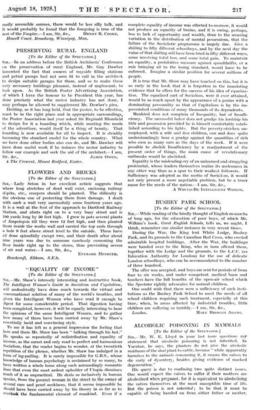"EQUALITY OF INCOME" [To the Editor of the SPECTATOR.] Sia,—Mr.
Shaw's intensely interesting and instructive book, The Intelligent Woman's Guide to Socialism and Capitalism, will undoubtedly have done much towards the virtual and ionversational solution of many of the world's troubles, and given the Intelligent Women who have read it enough to digest for some considerable period. That digestion having been completed, however, it will be equally interesting to hear the opinions of the same Intelligent Women, and to gather how many of them have been carried away by Mr. Shaw's essentially lucid and convincing style.
To me it has left as a general impression the feeling that here and there Mr. Shaw has been "talking through his hat." Re speaks so repeatedly of redistribution and equality of income, as the surest and only road to perfect and harmonious Socialism, that the reader begins to wonder, at the twentieth repetition of the phrase, whether Mr. Shaw has indulged in a form of leg-pulling. It is surely impossible for G.B.S., whose knowledge of human psychology is acclaimed by so many, to have written a whole tome along such astoundingly romantic lines that even the most ardent upholder of Utopia dismisses much of it as unpractical. He deals so inclusively in human sPeeies, from the poorest woman in the street to the owner of several ears and pearl necklaces, that it seems impossible he Should have been carried away by his theory in so far as to overlook the fundamental element of mankind. Even if a complete equality of income was effected to-morrow, it would not produce an equality of brains, and it is owing, perhaps, less to lack of opportunity and wealth, than to the amazing variation in the distribution of mental possessions, that the failure of the Socialistic programme is largely due. Give a shilling to fifty different schoolboys, and by the next day the value of that shilling will have been tried in fifty different ways, some involving total loss, and some total gain. To maintain an equality, a prohibitive measure against spendthrifts, or a rule bringing all to the losing standard, would have to be enforced. Imagine a similar position for several millions of people.
It is true that Mr. Shaw may have touched on this, but it is so early in the book that it is forgotten in the inundating evidence that he offers for the success of his idea of equaliza- tion. The equalized cart of Socialism, were it ever attained, would be as much upset by the appearance of a genius with a dominating personality as that of Capitalism is by the im- poverished conditions of many thousands of its dependents.
Mankind does not complain of Inequality, but of Insuffi- ciency. The successful baker does not grudge his lordship his title and possession provided he is himself comfortably estab- lished according to his lights. But the poverty-stricken un- employed, with a wife and five children, can and does quite understandingly bear a grudge against the quantities of rich who own as many cars as the days of the week. If it were possible to abolish Insufficiency by a readjustment of the present order of things, the main cause of revolutionary outbreaks would be abolished.
Equality is the misleading cry of an unlearned and struggling proletariat, whose leaders themselves realize its uselessness in any other way than as a spur to their weakest followers. If Sufficiency was adopted as the motto of Socialism, it would not only present a more negotiable problem, but be a truer name for the needs of the nation.—! am, Sir, &c., A WOULD-BE INTELLIGENT WOMAN.
































 Previous page
Previous page